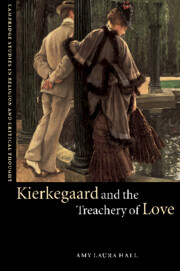Book contents
- Frontmatter
- Contents
- List of abbreviations
- Preface
- Introduction
- 1 The call to confession in Kierkegaard's Works of Love
- 2 Provoking the question: deceiving ourselves in Fear and Trembling
- 3 The poet, the vampire, and the girl in Repetition with Works of Love
- 4 The married man as master thief in Either/Or
- 5 Seclusion and disclosure in Stages on Life's Way
- 6 On the way
- Notes
- Works cited
- Index
1 - The call to confession in Kierkegaard's Works of Love
Published online by Cambridge University Press: 22 September 2009
- Frontmatter
- Contents
- List of abbreviations
- Preface
- Introduction
- 1 The call to confession in Kierkegaard's Works of Love
- 2 Provoking the question: deceiving ourselves in Fear and Trembling
- 3 The poet, the vampire, and the girl in Repetition with Works of Love
- 4 The married man as master thief in Either/Or
- 5 Seclusion and disclosure in Stages on Life's Way
- 6 On the way
- Notes
- Works cited
- Index
Summary
WRITING TO OFFEND
Christianity is not infrequently presented in a certain sentimental, almost soft, form of love. It is all love and love; spare yourself and your flesh and blood; have good days or happy days without self-concern, because God is Love and Love – nothing at all about rigorousness must be heard; it must all be the free language and nature of love. Understood in this way, however, God's love easily becomes a fabulous and childish conception, the figure of Christ too mild and sickly-sweet for it to be true that he was and is an offense …
(WL, 376)From Kierkegaard's conclusion to Works of Love, this passage reveals a salient feature of the text as a whole. Throughout the book Kierkegaard pushes the reader, in direct and subtle ways, to perceive Christianity as that which should cause precisely the “self-concern” that a falsely “soft” presentation of love seeks to palliate. He intends the text to evoke earnest self-examination. The sections incrementally build toward a confession of sin, and one reader at whom he aims his rhetorical power is the previously blithe Christian. In contrast to the “soft form of love,” Kierkegaard's text is like a “strength-testing machine,” a strenuous device whereby one discovers one's utter weakness (WL, 245). His complex prescriptions for and descriptions of faithful love place us before love's exacting test, revealing our inability to meet what faith requires.
- Type
- Chapter
- Information
- Kierkegaard and the Treachery of Love , pp. 11 - 50Publisher: Cambridge University PressPrint publication year: 2002



